The time has come to find our answer to this question that has perplexed many a visitor to the Yuanyang rice terraces, bound for Jinhong in the Xishuangbanna southern Yunnan tropical region bordering Laos. Everyone agreed that there was no direct bus to link the two regions which are more than 500km apart. But there were different options on offer, depending on whether you wanted the quickest, the easiest or the most scenic.
Backtracking to Jianshui (or even Kunming!) was one way and thought the quickest due to the expressway connection between Kunming and Jinghong. The one negative aspect about this approach was our foreknowledge that this surely involved a long ride on a sleeper bus with no guarantees that we will get a lower berth. The way we felt about these sleeper buses, we would much rather connect through Vladivostok.
The alternative way was to make a two step connection involving the towns of Luchun and Jiangcheng which will require a night (or two) stay enroute. The route is expected to be spectacular but the ride uncomfortable due to road conditions. The owner of the guesthouse we stayed overlooking the rice terrace advised against this due to the risk of landslides on this mountainous route. We were certainly confident that this route did not involve the dreaded sleeper buses.
So, what do you think? Our requirement was to get to Jinghong as quickly as possible without getting on a sleeper bus.
We met an American traveller on the rice field who had just done the route in reverse and had taken the hilly route via Luchun. He confirmed that landslides had blocked much of the roads and only small buses could negotiate the tight corners. It was still early in the rainy season and the situation was only expected to get worse.
We had a conversation with Jacky who owned the guesthouse down the path. He spoke fluent English and had a totally unexpected third option. He started by a very simple but perplexing statement. Just follow the Red River. What? You mean, take a boat? No, take a bus that follows the river. OK, what manner of bus is this that follows the river that we had not heard of? (And more importantly, would it be a sleeper bus?) He took a pen and wrote down this formula in Chinese/English:
Nansha -> Honghe -> Yuangjiang -> Jinhong
We were familiar with the first name Nansha having arrived at the village via Nansha, the town at the bottom of the hill. The two names in between were unfamiliar. Jacky's theory was that these two towns were on a quick path to the expressway which would dramatically cut short the total distance traversed. Moreover, he was confident that this could be achieved in a single day if one got an early start to Nansha. We checked the map and found that this made geometric sense and Yuanjiang was close enough to the expressway to give us a hope of catching a bus enroute. We were eager to chart this new course and felt that this is just the sort of adventure we needed.
So, what really transpired? First, we got the early start which we had planned anyway to watch the terraces in the morning light. We managed to climb back from the guest house to the road, crossing a few roosters and cats. Flagged down an empty van which got us to the Xinjie bus station on top of the hill in a half hour (25 km). Just for practice, we showed Jacky's magic formula to the woman behind the ticket counter. She just snorted in contempt as we took her from right to left. She refused to even utter the name of any town other than Nansha. We were expecting that but happy to get warmed up to the formula.
An hour later, we approached the ticket woman at Nansha and tried the same magic spell. She too rejected the names we read from right to left: Jinhong, Yuangjiang, not even Honghe? We can't just stay here at Nansha, can we? We pressed on for an opening and she relented and gestured outside the building. Was it another ticket office she was referring to or a bus waiting outside? She understood that we did not understand and was good enough to escort us out of the building and call out to another woman who was shouting "Honghe! Honghe!" as if it was a long lost child of hers. Satisfied that this was a bonafide procedure and relieved that Honghe actually existed, we boarded the small bus. Obviously, Honghe was still not an "official" destination. After a reasonably respectable count of people were accumulated in the bus through further utterances of the "Honghe" rallying cry, we got rolling. Sure enough, the bus hugged a red colored river through some spectacular mountain scenery with several landslides along the way which had been cleared recently. The road was well paved and looked brand new which explained why this route was not well known. We saw several banana fields on the way and were surprised when someone boarded the bus on the road with a huge clutch of bananas which he gave away to the passengers. The conductor who had now stopped calling "Honghe" saw our paper with the magic formula and made reassuring noises about Yuangjiang.
The 50km distance to Honghe was completed in an hour's time. Honghe appeared to be a brand new town for the most part with wide clean roads and high rise apartments. The bus station was in an older part of town. As soon as the bus pulled in, our conductor jumped out and beckoned us to follow her. The queue was not very long, but she shorted even that and got us tickets to the next bus to Yuangjiang. Next, she asked us if we wanted to eat xifang, but we politely declined. People like her are a great wonder and we should be thankful for such random unprovoked kindness. We had to wait more than an hour for that bus to leave. Several people went out to get food but we chose to stay on the bus and eat our prepared lunch.
The route from Honghe to Yuangjiang also followed the Red River (is that really its name? Why not? We have several Colorado Rivers in the US and they too mean the same thing) but was even more spectacular. Another 50km, another hour. Will Yuangjiang produce the connection to Jinghong? Not quite! More headshakes from another ticket woman and a lot of Chinese that we could not follow. When she saw that we could not understand, she wrote down her message in Chinese and showed the paper to us! Perhaps, she thought we were Cantonese who could not understand spoken Mandarin but could read written Chinese script? Flattering, but unlikely. But the message was clear. No more Jinghong bus jintian (today). Mingtian (next morning) was the next one. But, but, if we wanted to, we could catch a bus to Mojiang (75 km away) and see what happens. Our tablet revealed that Mojiang was on the expressway and so we felt that we should move on. Yuangjiang was much hotter in the early afternoon sun and our bus seemed to have no fixed timing. In fact, the departure time printed on the bus was the time of the ticket issue. We were just told to wait in the hall.
We were restless and went out in the hot sun and saw a bus with the matching Chinese characters for Mojiang and approached the driver. He smiled and gestured for us to go back to the hall and wait. The driver came in and pointed to another woman (obviously the conductor) as the one to watch for. We approached her and she too gestured for us to wait.
A young Chinese girl saw us and requested to speak to us in English. After a couple of cursory questions that seemed to satisfy her, she ran out of English words to speak. We showed her our ticket and asked if she can figure out when our bus would leave. She took one look and got all agitated. Your bus is gone! So sorry!! We reassured her that our bus had not left and that the time printed on the ticket had nothing to do with the departure time. She did not understand but kept muttering. Mercifully, her bus to Shiping was boarding and she had to go. She said goodbye with a look of concern on her face.
We approached the ticket counter after waiting for an hour and were told that the bus would leave at 4pm which was another hour away. 15 minutes later, the conductor woman left the hall with a flurry of people behind her. We ran after her and saw her climb on to a bus. She saw us and nodded, yes, this is your bus. So, why didn't she give us a warning? We took our seats and it dawned on us that we had just left our cool seats under the fan in the waiting hall, for a seat in a boiling bus and that did not look like it was going to leave soon. A Chinese woman who was seated behind us suddenly screamed and ran out of the bus fanning herself vigorously. It was obvious that the heat was getting to her. On this cue, the Chinese men in the bus, who needed no further encouragement, progressed from baring their midriffs to removing their shirts.
The bus left 15 minutes before 4 pm to everyone's relief. We forgot all about the annoying wait, with the gorgeous scenery along the expressway to Mojiang. We could see the effort it took to build the expressway with impossibly long tunnels and bridges and the mountain walls secured with lattices filled with concrete and sandbags to prevent landslides. There were relentless 15km long upgrades followed by tunnels and equally long downgrades. It seemed brand new with several service stations along the way still under construction.
We pulled into Mojiang a little before 5 pm and got a negative answer at the ticket counter. No more JInghong buses today. Come back tomorrow morning. Someone at the other counter heard this and suggested that we take a bus to Pu'er (150 km away) and try there. The proximate operating radius seemed to have increased on the expressway and hopefully, we will find our elusive Jinghong bus from Pu'er. Fortunately, our wait here was less than 15 minutes. Just enough to stretch, use the bathroom, cool off with some ice cream and then start afresh.
After 3 more hours of even more eye-catching scenery we pulled into Pu'er at 8 pm. The station looked brand new but deserted. We saw a hotel in the same building as the station and wondered if they will have room for the night. Even as we got off the bus, uniformed staff at the station looked at us and asked "Jinghong?". Delighted that this was no fictitious name conjured up by mischievous cartographers to play a joke on the unwary traveler, we nodded happily. Another uniformed woman, pointed inside to the ticket counter with a sense of urgency. Magically, a bus to Jinghong was leaving within 15 minutes.
We dozed for a bit on the 8:30 bus to Jinghong and were woken up by the presence of Chinese soldiers entering the bus. We saw everyone pull out their IDs and so reached into our packs for our passports. A young soldier saw our passport wallets and politely gestured to put them back without him taking a look. Outside the bus we saw a few more soldiers with several civilians sitting or lying on the road. They appeared to be ID-less, but not too concerned, merely bored. We wondered if they had illegally crossed the border.
At 10:30 pm, we pulled in to a brightly lit Jinghong after crossing the mighty Mekong river. The buildings had Thai style architecture and we saw Laotian script everywhere along with Chinese and English. We still had enough determination to refuse the exploitative offers from the taxis outside the bus station and walk away. In the wrong direction. We flagged one passing by and ended up paying the same amount demanded by the first one. It is the principle of the thing.
And so, we made it from the Yuanyang rice terraces to Jinghong on the same day in 7 different vehicles. No sleeper buses. And just a step away from Laos. Happily, the International Youth Hostel close to the station had room for us.
Thanks for reading this long post. When I first started this, I was only planning to type in the following:
An illustration of the principle of proximate operating radii. Data sample from July 7, 2012.
6:45 am: Leave guest house at Douyishu village
7:15 am: Minivan to Xinjie (25 km/30 minutes)
8:00 am: Xinjie to Nansha Bus (30 km/1 hour)
9:45 am: Nansha to Honghe Bus (60km/1 hour)
12:30 am: Honghe to Yuangjiang Bus (60 km/1 hour)
3:45 pm: Yuangjiang to Mojiang Bus (75 km/1 hour)
5:00 pm: Mojiang to Pu'er Bus (150 km/3 hours)
8:30 pm: Pu'er to Jinghong Bus (120 km/2 hours)
10:30 pm: Arrive Jinghong
But just as it did enroute, it turned out differently.
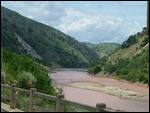
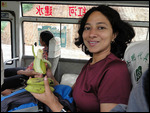
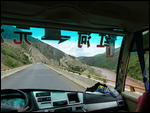
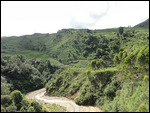
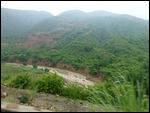
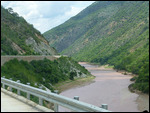

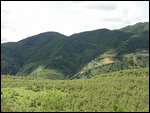
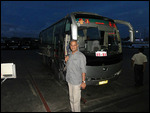


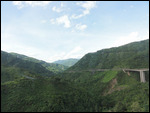
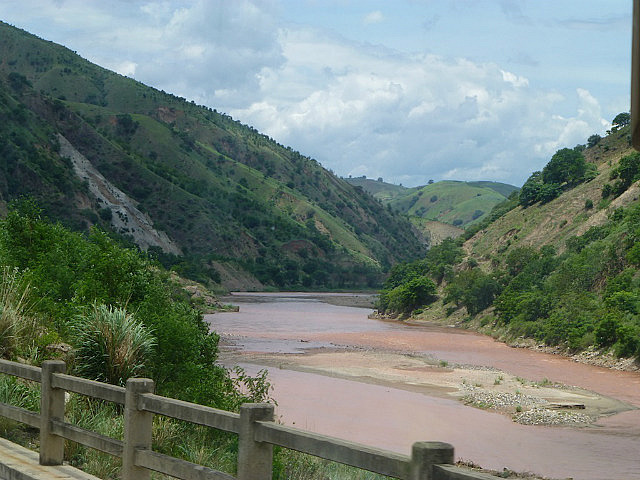
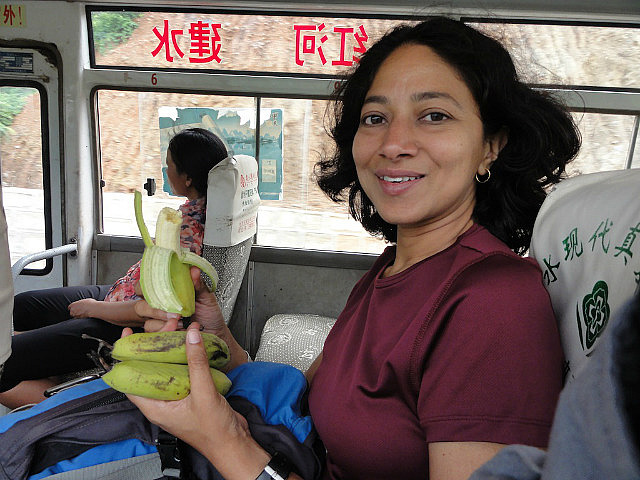
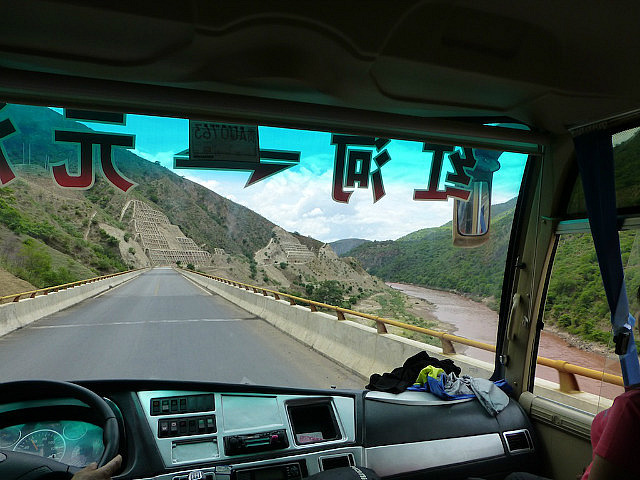
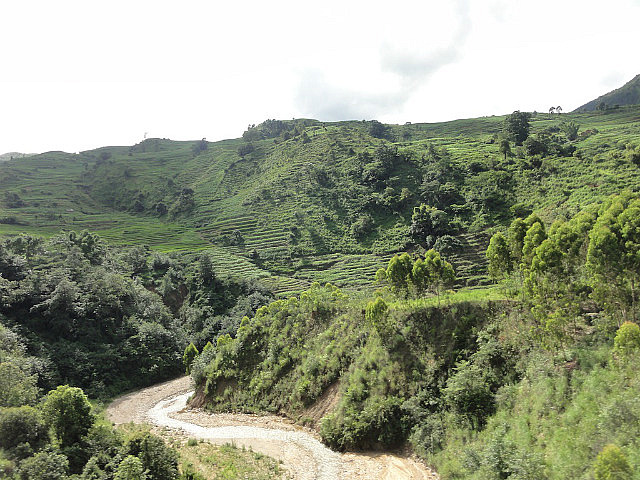
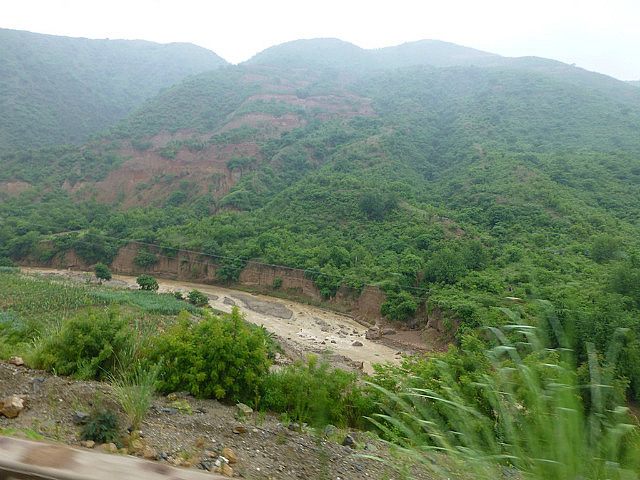
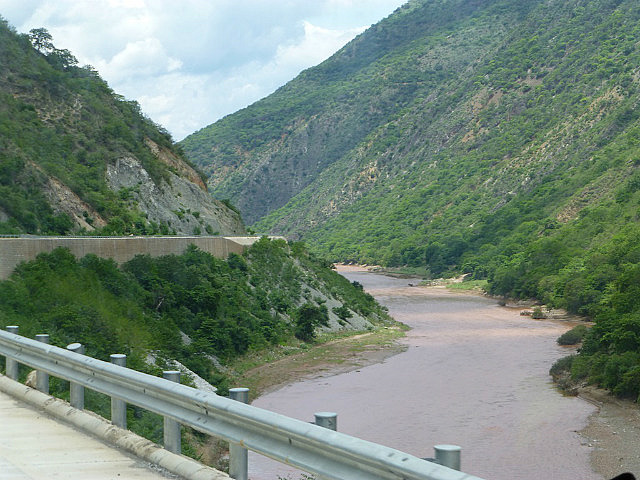
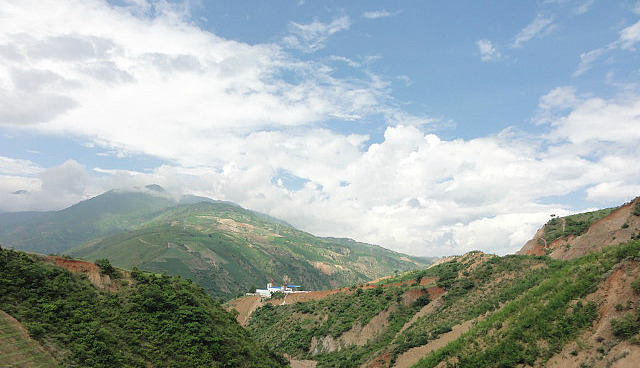

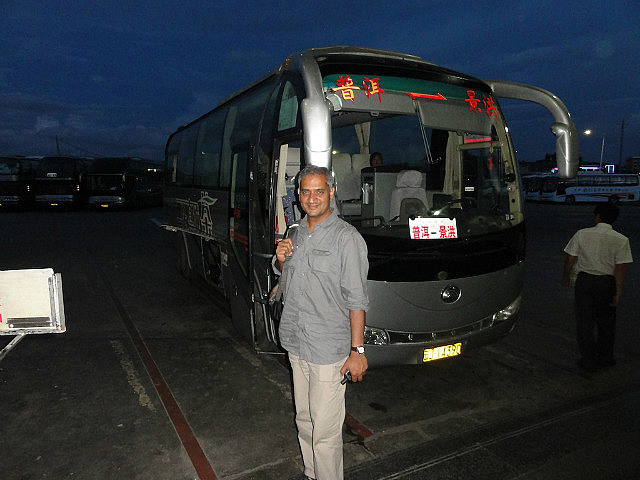
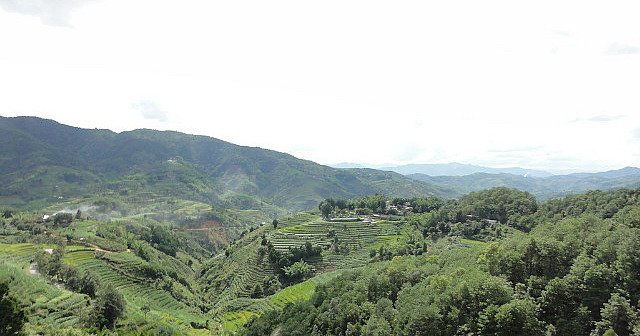

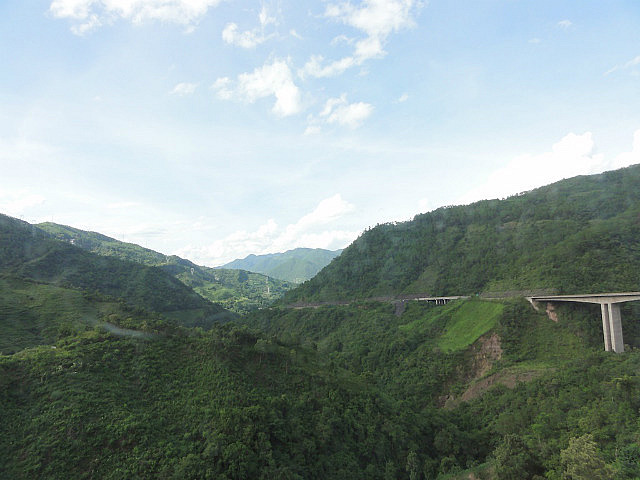
Comments